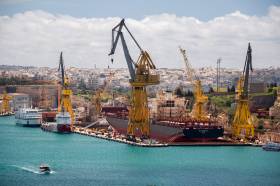Displaying items by tag: Maritime Year of EU
ESPO Mark the Maritime Year of the European Union
#MaritimeYearEU -The European Sea Ports Organisation (ESPO) issued a statement yesterday to contribute to Maritime Year of the European Union and to follow up on the Valletta Declaration, the ministerial declaration on maritime transport, adopted on 28 March focusing on competitiveness, digitalisation and decarbonisation.
“We welcome the Valletta Declaration as a first milestone of the Maritime Year,” says ESPO’s Secretary General, Isabelle Ryckbost. “We hope that the Maritime Year will reinforce the support for modern, sustainable and well-connected European ports, will pave the way for maritime trade facilitation and simplification and, last but not least, will embrace the sustainable agenda of European ports”.
“We look forward to working further with the Commission and with the Maltese and Estonian Presidencies to make this Maritime Year a success in strengthening the European maritime and ports sectors.” says ESPO’s Chairman Eamonn O’Reilly.
In essence, ESPO’s statement reiterates the importance of well-connected and modern ports. Ports in Europe are facing several challenges that have a major impact on the requirements for infrastructure investments’ needs. For European ports it is important that Europe continues to increase its investments in the port sector. CEF grants are and must remain the critical component of the funding mix. ESPO calls on European and national policymakers to consider ports as strategic assets. Investments in essential and/or critical European port infrastructure of general interest should be assessed from that perspective.
In view of facilitating maritime trade, European ports plead for administrative simplification and removing customs obstacles to EU goods transported between European ports. The focus should lay on simplification (reduce formalities) and harmonisation (asking the same data in the same way). The most innovative digitalisation technologies should be fully taken into account when developing a single window environment. Moreover, interfaces and platforms can only function if they have a governance dimension: they must receive the competences and responsibilities needed to pass the right information to the different authorities. If not, the single window will not result in trade facilitation and simplification, but will just shift the burden from the ship side to the competent authorities.
ESPO and its members express their concern about possible new trade barriers and their impact on the free flow of goods and just-in-time logistics. If new trade barriers are being introduced, these should be tackled in the most effective way. Every effort should be made to ensure that European ports can remain efficient and seamless entry and exit points for trade.
Last but not least, ESPO and its members put a strong emphasis on their sustainable agenda. As an essential part of the logistic chain, main gates to the world, nodes of energy and industry clusters, European ports must contribute to the global, European and national climate and decarbonisation agenda. In that respect, ESPO strongly believes that IMO would be by far the optimum forum in which to introduce CO2 target and measures to reduce emissions from shipping in line with the Paris Agreement. However, 2023 must be seen as a milestone. A six year period is sufficient time for the IMO to discuss and agree on the necessary target and measures.
Moreover, as nodes of energy and increasingly important clusters of industry and blue economy, ports in Europe are developing a low carbon strategy. The first aim is to cut emissions and improve energy efficiency. But, ports should also turn the path towards decarbonisation into a successful business case. Finally, ports in Europe will have to adapt the port infrastructure to the effects of the warming. They are at immediate risk as sea levels rise and extreme weather conditions occur.
The decarbonisation of the shipping industry as well as the overall greening of the shipping sector, imply additional investments and facilities in ports. Some of these investments will not be bankable in the short run. Additional grants and other financial instruments are essential for decarbonising the ports, for making ports more resilient to the consequences of climate change and for helping ports to contribute to decarbonising the economy.
As regards air quality, ESPO very much welcomes the decision of IMO to introduce a global 0.5% sulphur cap in 2020. This decision is expected to bring enormous environmental and public health benefits.
Finally, as concerns the forthcoming review of the waste reception facilities directive, European ports are of the opinion that the current directive has been successful in substantially decreasing ship waste discharged at sea. ESPO supports the alignment of the directive with MARPOL. The review should however safeguard the flexibility of the different fee systems while addressing the problem of delivery of an “unreasonable” amount of waste in a given port.
Read the full statement here.
























































